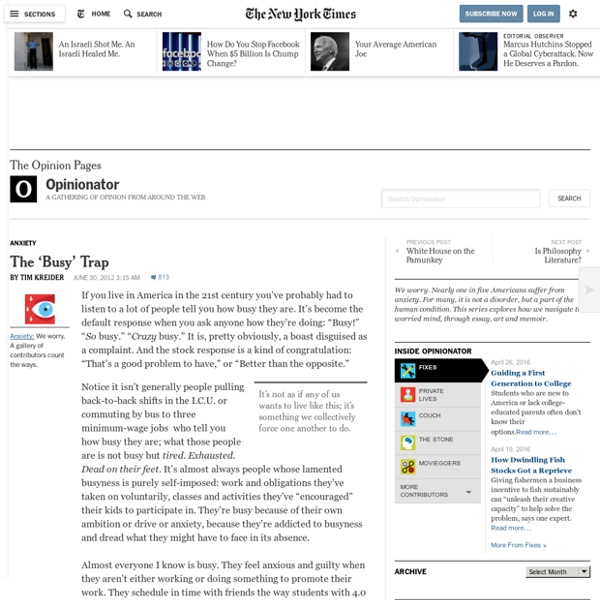Why America Can't Have It All - By David Rothkopf
Anne-Marie Slaughter's article "Why Women Still Can't Have It All" in the current issue of the Atlantic has sparked a firestorm of debate. Drawing on her personal experience balancing her distinguished foreign-policy career with the demands of raising two sons, the piece exposes an internal struggle within Slaughter and other women aspiring to both career success and a rewarding home life. But in so doing, it may do something more than that.
BEFORE THEY PASS AWAY
The purity of humanity exists. It is there in the mountains, the ice fields, the jungle, along the rivers and in the valleys. Jimmy Nelson found the last tribesmen and observed them. He smiled and drank their mysterious brews before taking out his camera. He shared what real people share: vibrations, invisible but palpable. He adjusted his antenna to the same frequency as theirs.
What Work Is Really For
The Stone is a forum for contemporary philosophers and other thinkers on issues both timely and timeless. Is work good or bad? A fatuous question, it may seem, with unemployment such a pressing national concern. (Apart from the names of the two candidates, “jobs” was the politically relevant word most used by speakers at the Republican and Democratic conventions.) Even apart from current worries, the goodness of work is deep in our culture.
Refined dining
Shaped in an age of scarcity, our appetite for sugar, fat and salt now torments us. But there is hope ©Magnum/ Martin Parr Martin Parr's 'GB. England. New British.
Bloom’s Taxonomy: The 21st Century Version
So much have been written about Bloom’s taxonomy; one click in a search engine will flood your page with hundreds of articles all of which revolve around this taxonomy. Only few are those who have tried to customize it to fit in the 21st century educational paradigm. As a fan of Bloom’s pedagogy and being a classroom practitioner, I always look for new ways to improve my learning and teaching, and honestly speaking , if you are a teacher/ educator and still do not understand Bloom’s taxonomy then you are missing out on a great educational resource. The following article is a summary and a fruit of my long painstaking research in the field of Bloom’s taxonomy. The purpose is to help teachers grow professionally and provide them with a solid informational background on how to better understand and apply Bloom’s taxonomy in classrooms in the light of the new technological advances and innovations.
Magazine - Why Women Still Can’t Have It All
The culture of “time macho”—a relentless competition to work harder, stay later, pull more all-nighters, travel around the world and bill the extra hours that the international date line affords you—remains astonishingly prevalent among professionals today. Nothing captures the belief that more time equals more value better than the cult of billable hours afflicting large law firms across the country and providing exactly the wrong incentives for employees who hope to integrate work and family. Yet even in industries that don’t explicitly reward sheer quantity of hours spent on the job, the pressure to arrive early, stay late, and be available, always, for in-person meetings at 11 a.m. on Saturdays can be intense. Indeed, by some measures, the problem has gotten worse over time: a study by the Center for American Progress reports that nationwide, the share of all professionals—women and men—working more than 50 hours a week has increased since the late 1970s. Revaluing Family Values
Derrick Jensen
by Derrick Jensen Photograph by Stephen Wilkes THE MOST COMMON WORDS I hear spoken by any environmentalists anywhere are, We’re fucked. Most of these environmentalists are fighting desperately, using whatever tools they have—or rather whatever legal tools they have, which means whatever tools those in power grant them the right to use, which means whatever tools will be ultimately ineffective—to try to protect some piece of ground, to try to stop the manufacture or release of poisons, to try to stop civilized humans from tormenting some group of plants or animals. Sometimes they’re reduced to trying to protect just one tree. Here’s how John Osborn, an extraordinary activist and friend, sums up his reasons for doing the work: “As things become increasingly chaotic, I want to make sure some doors remain open.
When You Can't Sleep, How Good Is Lying in Bed With Your Eyes Closed? - Brian Fung
The key differences between sleep and "quiet wakefulness" Fake-sleeping kitten, only fooling herself. (yoppy/Flickr)
The Clutter Culture - Feature - UCLA Magazine Online
By Jack Feuer Published Jul 1, 2012 8:00 AM "For more than 40,000 years," write the authors, "intellectually modern humans have peopled the planet, but never before has any society accumulated so many personal possessions." Get stuff.
Trickle-Down Distress: How America's Broken Meritocracy Drives Our National Anxiety Epidemic
Anxiety is growing into a peculiarly American phenomenon. How did we become the world's leading exporter of worrywarts? spaceodissey/Flickr
The Disadvantages of an Elite Education
Exhortation - Summer 2008 Print Our best universities have forgotten that the reason they exist is to make minds, not careers By William Deresiewicz



